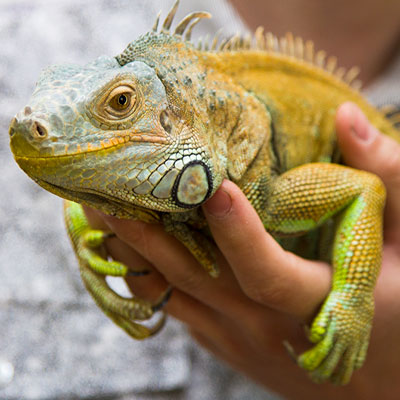Mon - Fri: 7:30am - 5:00pm
Sat & Sun: Closed
Understanding the Responsibilities of Being an Exotic Pet Owner
Omaha Exotic Pet Care: What You Need to Know Before Bringing One Home
Exotic pets can be fascinating, beautiful, and rewarding companions—but owning one is not as simple as bringing home a cat or dog. Reptiles, birds, amphibians, small mammals, and other unique animals each come with their own specific care requirements. At the heart of responsible exotic pet ownership is education and preparation—and the support of our veterinarians at Omaha Animal Hospital who specialize in Omaha exotic pet care.

Before adopting an exotic pet, it’s important to research its habitat, diet, social needs, and life span. Many exotic animals require very controlled environments. For example, reptiles often need specific heat and humidity levels, while some birds require large cages and regular mental stimulation to stay healthy. Exotic pets can also live a long time—parrots, for instance, can live for decades—so it’s essential to be committed for the long haul.
Proper nutrition is another major responsibility. Exotic pets often have dietary needs that can’t be met by food found at a typical pet store. Owners must source the right types of food—whether that’s live insects, fresh produce, or specialty pellets—and understand the correct portion sizes and feeding frequency. If fed improperly, many exotic pets can quickly become ill or malnourished.
Veterinary care is just as critical for exotic animals as it is for more common pets. However, not all veterinarians are trained in exotic species. That’s why finding a provider who offers Omaha exotic pet care is essential. Our veterinarians have the training, tools, and experience needed to properly diagnose and treat a wide variety of exotic animals, from ferrets and rabbits to snakes and parrots.
Enrichment and socialization are also key components of exotic pet ownership. Without enough mental and physical stimulation, many exotic animals can become stressed, destructive, or even ill. Owners should be prepared to provide toys, interaction, and species-appropriate activities every day.
Perhaps one of the most overlooked responsibilities is legal compliance. Some exotic animals are subject to local or federal regulations. It’s important to check whether your pet is legal to own in your area and to understand any permits or documentation that may be required.
At the end of the day, owning an exotic pet is a serious responsibility—but with proper preparation and support, it can also be an incredibly rewarding experience. If you’re already an exotic pet owner or considering becoming one, trust professionals who specialize in Omaha exotic pet care to guide you in providing the best possible environment and health care for your unique companion. Contact Omaha Animal Hospital today to get started!


